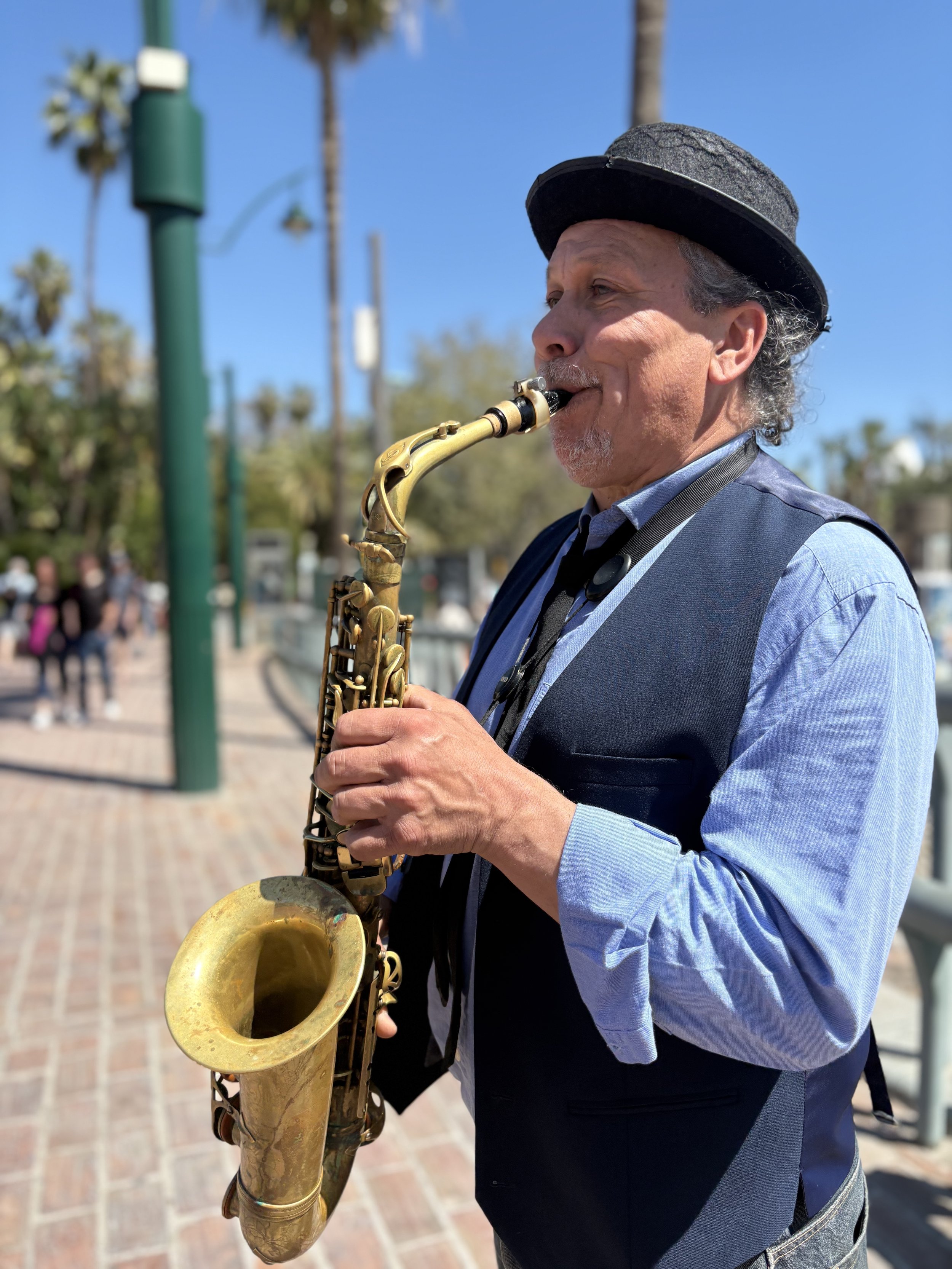
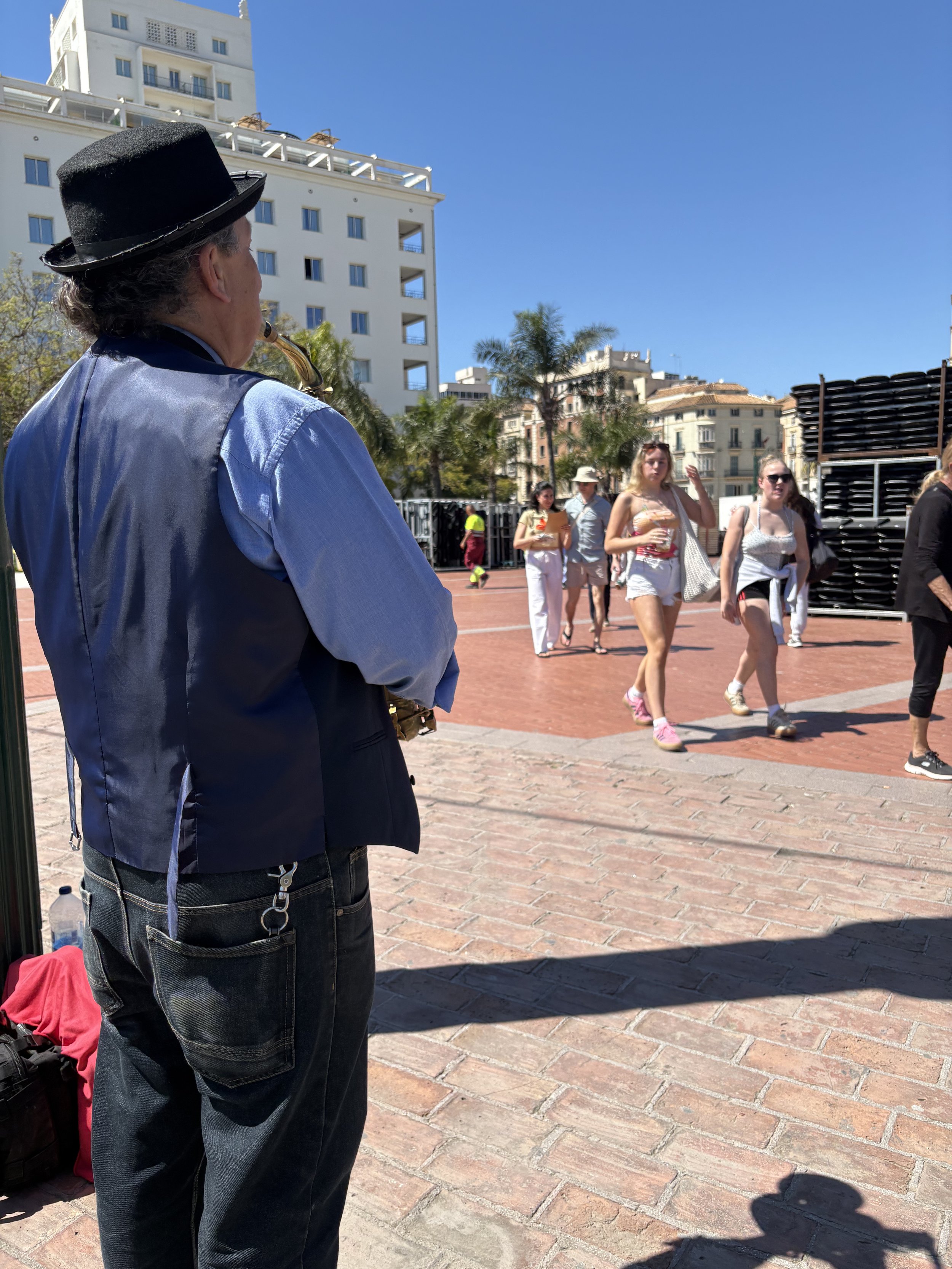
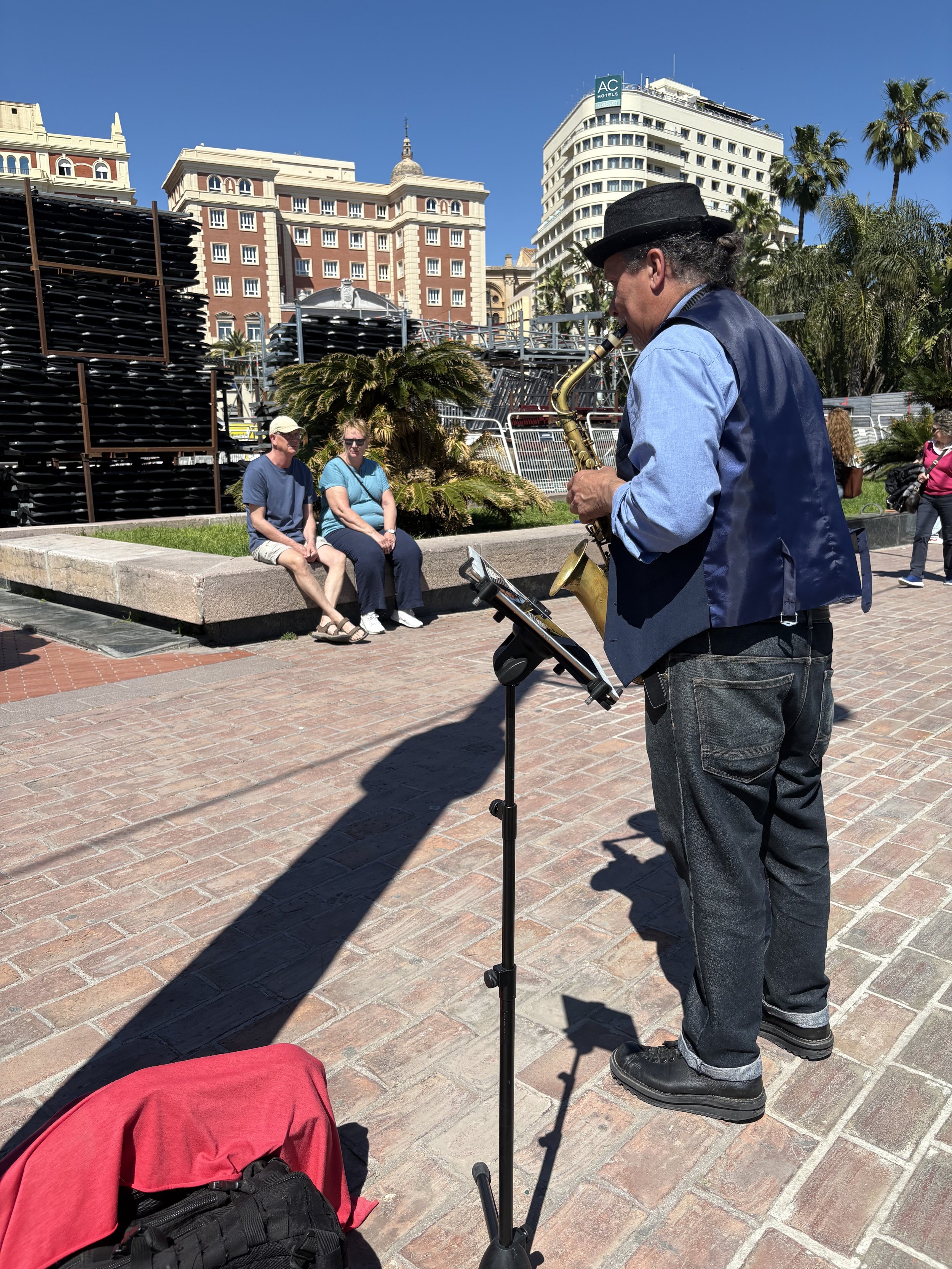
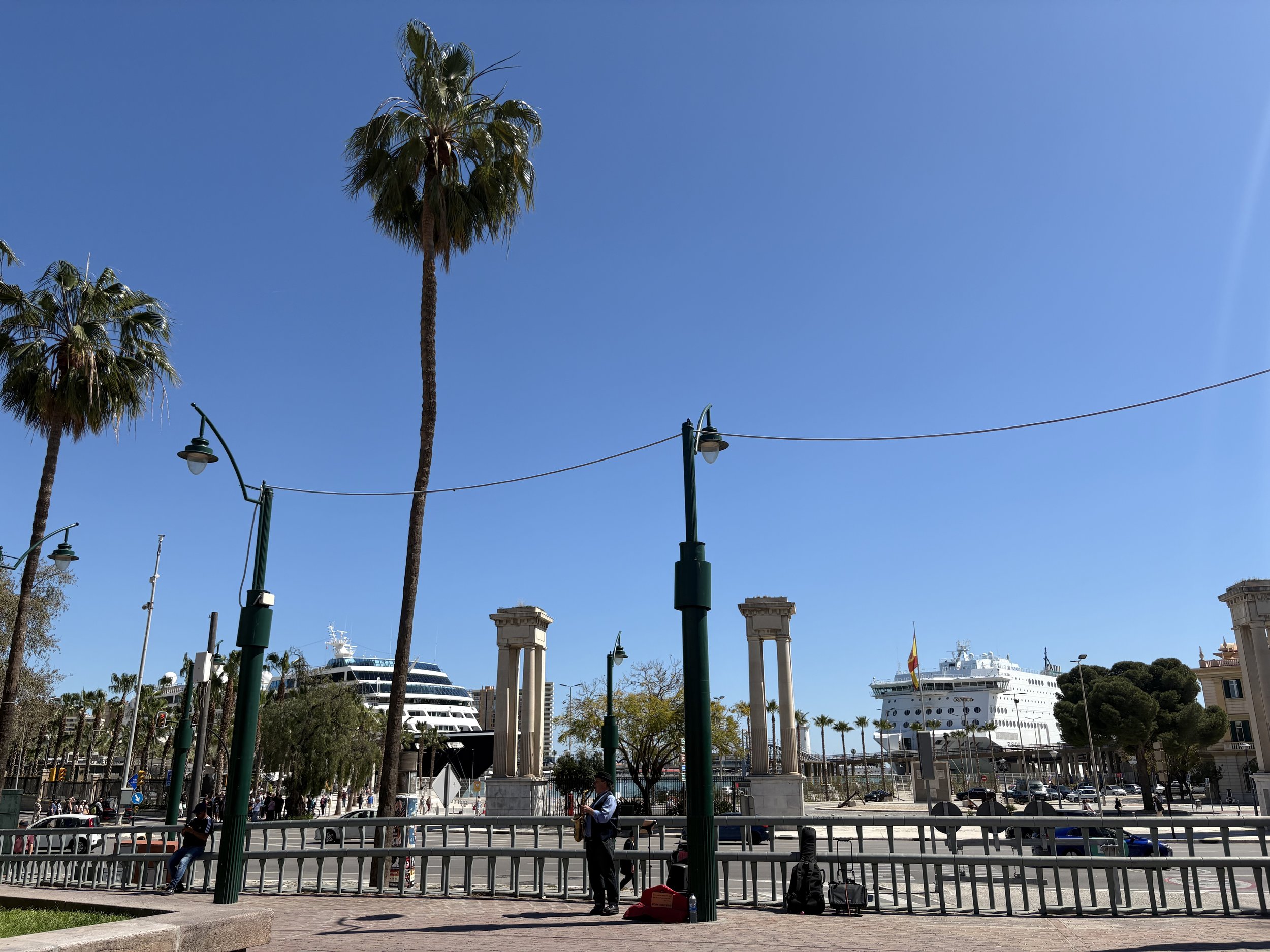
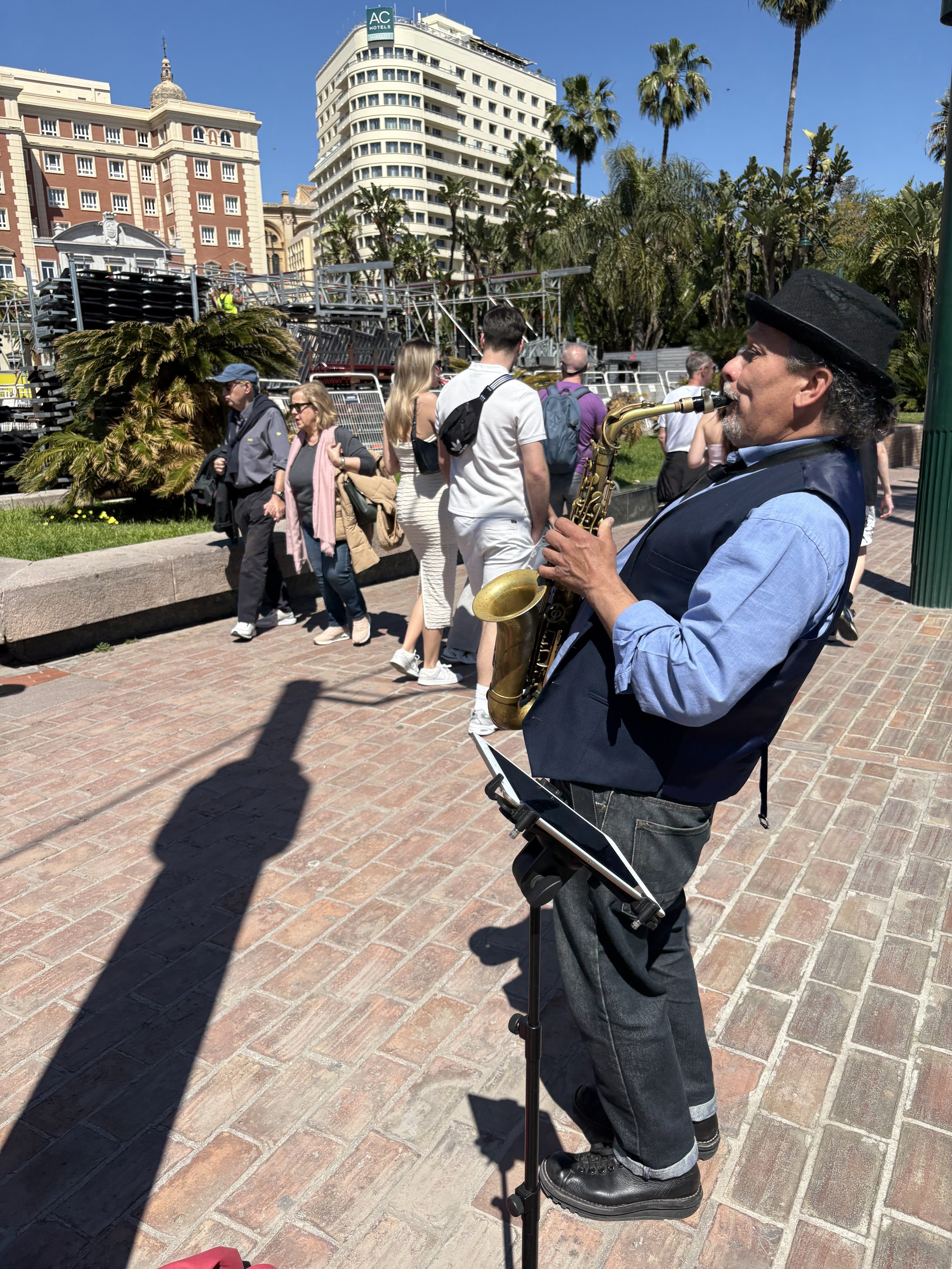
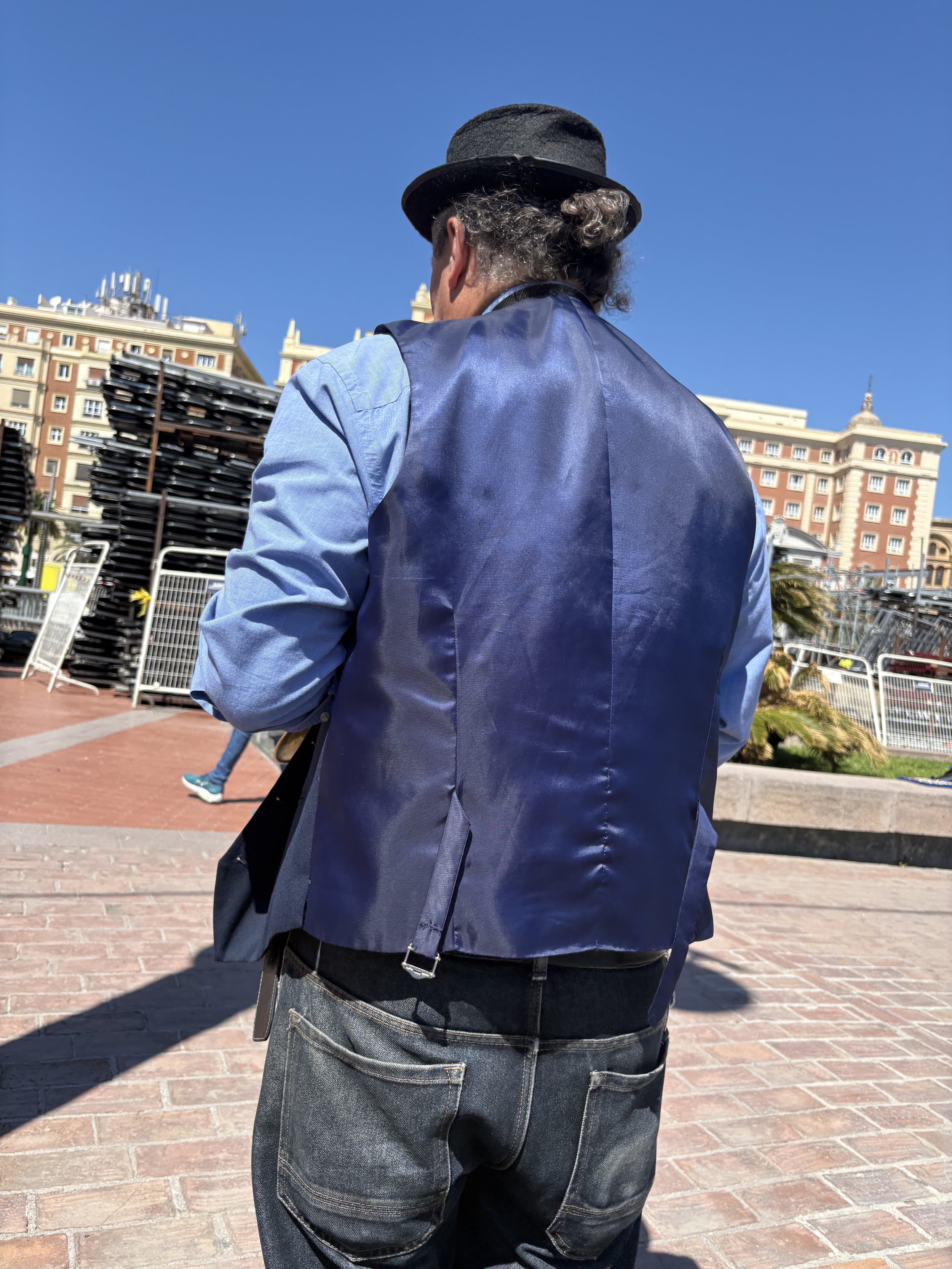
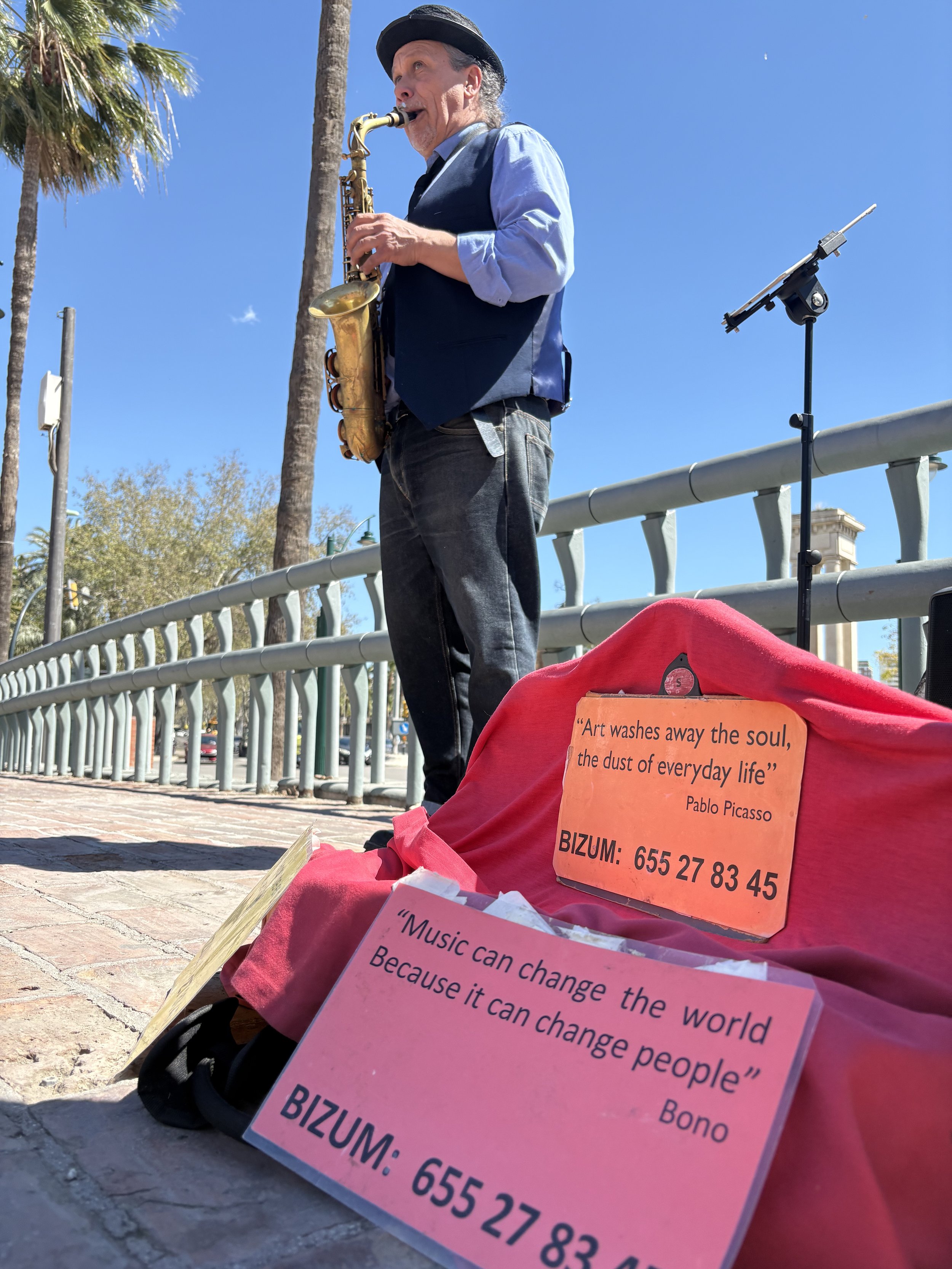
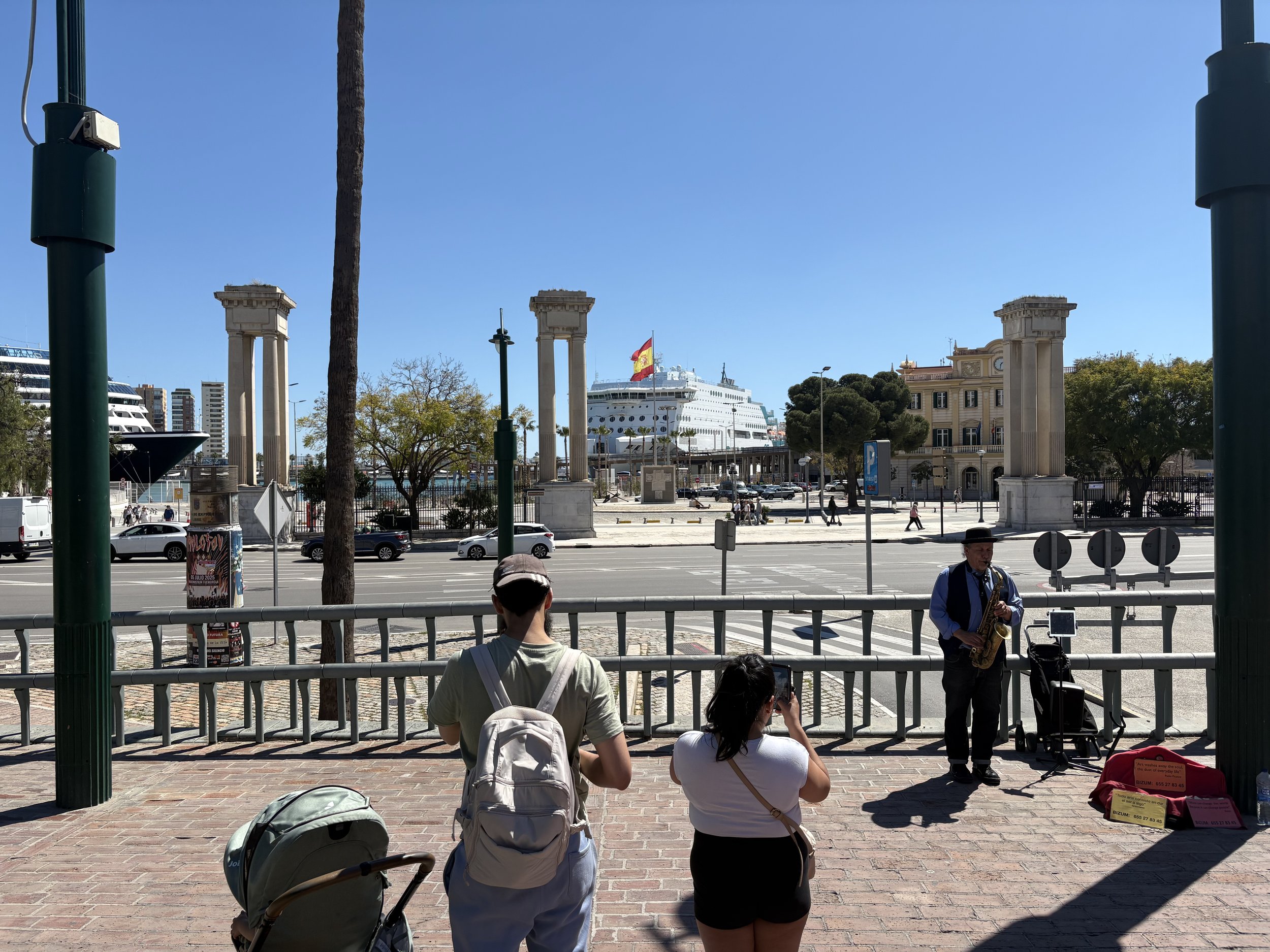

Germán del Valle Suárez Stoelzel
There are not very many older people playing music on the street. Rarely do I find someone who might even approach my age. However, on a sunny afternoon as I walk through Plaza de la Marina, I spot someone playing saxophone who might actually be a contemporary of mine. Dressed in a vest and donning a graying head of hair pulled back and tied in a short bun behind a black bolero hat, German is playing his saxophone to a backing track of Killing Me Softly, by Roberta Flack. For many street musicians, the backing track is the perfect band. Played through an amp via a phone or a tablet, it’s always in time, has perfect pitch and never hits a bad note. With qualifications like that, Germán fits seamlessly with his backing track. In the plaza, which connects the city center to the port of Málaga, Muelleuno, Germán combines his love for soul, jazz and pop from the 1960s and 1970s to add a little bounce to the step of those making there way back and forth. From the Frankie Valli, Paul Anka and Frank Sinatra hit, “Can’t Take My Eyes Off Of You,” to Billy Joel’s “I Love You Just The Way You Are,” Germán plays beautiful melodies with his fantastic backing band. For those who think that musicians who play on the street do it because they have no other options, think again. With a resumé that includes a stint as a Senior Saxophone Professor at the Luis Gianneo Conservatory of Music in Córdoba, Argentina as well as an instructor of master classes and symposia, Germán has had a lifetime of music in more traditional settings, but the street is where he loves to shine.
My name is German del Valle Suarez Stoelzel, but in Spain I have many problems with my name because in Argentina you can have two last names, but many people just have one. The last part of my first name is del Valle. When I say my name is German del Valle, the people think my last name is del Valle. My second last name is Stoelzel. My grandfather is German. I am 57 years old. I am a Leo. I was born in 1968 in Córdoba, Argentina.
We only listened to the music on the radio in my house. We had some cassettes. My first exposure to music or art was when I was 6 or 7 years old. People recommended to my mother that she sign me up for some activities, so I started folkloric dance classes. We had to do choreography with zapateo and malambo dancing, and percussion with a big drum made of a tree trunk and goat skin called el bombo. The dancing is very fast with the feet. Sort of a cousin of tap dancing let’s say.
When I was young and visited my father during the summer, my father had a restaurant and had live music shows called Peña Folklórica. On the weekends, my father would play guitar and sing. My brother and I dressed up in folk costumes and I played these instruments and danced. I sang and danced with a heavy percussion beat.
My brother and I were in this academy for learning folkloric dance from ages 8 to 12. After that, we became teachers in the academy for the younger kids because we knew the rhythms. Whenever there were some kinds of arts and performances in primary school, my brother and I always did this. When I finished primary school, the music teacher told my mother, “Your sons have an aptitude for music, so you should sign them up for the municipal youth band.” We were told to choose an instrument and my brother chose the trumpet while I chose the saxophone.
In reality, I didn’t like it immediately because I had to study music theory and other things, but I fell in love the moment I saw the instrument – the shape, the tone, the shine. I saw a military band rehearsal with all the instruments, and the moment I saw the saxophone I was hooked. I was thirteen then, and I joined a civic band. We did jazz, boogie woogie, fox trot, marches, everything. The repertoire was based on bands from the US.
At 14, I entered the conservatory, but in this time, there was no program for saxophone, so for two years I played a pipe flute and percussion. I played in an orchestra with percussion, timbale, singers, wind instruments, piano and guitar. It’s interesting that actually at this time I didn’t really listen to much music. On the weekend my neighbor or family would put on a record on the weekend, maybe tango, but that was it. Maybe some music on a TV show on Sunday, but that was it. I remember hearing Fausto Papetti on the radio. This was the first time I head saxophone on the radio, very melodic.
By 16, I was already making twice as much money as my mother every month playing dance clubs at different towns where families went to dance, so I left the conservatory. When I was young, my parents did not support my decision to be a musician. They wanted me to study medicine or accountant or some profession with a secure future.
When I was 18, I don’t think I had much talent to play saxophone. I decided to dig a little deeper into music and step out of my usual social circle and ask other people, even older people, about where to go to study, and they all sent me to kind of a hippie community music school, where they taught all kinds of instruments. This institution, La Colmena, had the best reputation and best musicians for jazz in Córdoba. Remember, there was no degree for the saxophone at that time in the university. A degree didn’t exist until 1996.
Jazz was no more attractive than folkloric music for me at this time. I really love the folkloric music, tango, bossa nova, samba and music from my background. I feel so comfortable with this kind of music.
In Córdoba, if I wanted to make a living from music, I needed to move around a lot, to go play in some place one day, teach a class the next, go with a band and do some performance the next weekend. At 21 years old, I began giving private lessons.
When I was around 32 years old, I had a friend who played guitar and we used to play all the time for hours learning phrases and at some point, we said, “Hey, why don’t we play outside in the street?” My friend’s girlfriend had a little kiosk in a weekend market where she sold handcrafts, so we went there to play next to her stall with amplifiers. We did this every Saturday and Sunday for two years. We earned reasonably good money, which is probably why we lasted so long, but we didn’t do it for the money. We did it to share the experience with people. At the same time, I was giving private saxophone classes at home. I would pass out fliers round town looking for students, but I never got as many students as I did from the times I was playing at the market.
I traveled from 1998 to 2001 with an ensemble called Argentina Canta y Baila. We went to Cancún, México, Miami – during Hurricane Mitch, so we couldn’t play – Granada, Spain and the National Festival in Sevilla and Barcelona. Then we went to Italy, to Rome and Venice. We went to Cuba, many places. The musicians were in charge of playing between the acts of our dance show. We were 60 people in total!
I had traveled before. I went to Brazil, and then I lived in Bolivia for four years and Chile for a year also, but I had never taken a plane before. I was fascinated by this journey with this ensemble. Of course it exposed me to new things, but everything in life changes you as a musician if you know how to pay attention. For example, when I was in Italy I listened to Javier Girotto. He is a genius player from Córdoba who had moved to Italy. And in Cuba, I heard amazing sax players. It opened up so many more opportunities. I was so motivated and ready to learn more after these travels.
Around this time, the conservatory began a saxophone program. When I became 36 years old, I went back to the conservatory and they allowed me to skip the first 4 years of the 7-year degree program, and I became a music teacher of saxophone at the conservatory at 39 years old. Now I have an official degree in saxophone. Then, I went to a conservatory in a village 80 kilometers away to teach. I love teaching. It’s fantastic. At this age, I already had many years of experience teaching. Particularly after the year 2000 with the internet and more information, it became so much easier to find study materials, so I even learned so much more at this time.
First of all, I moved to Spain in 2018 because I was bored. I created a comfort zone that was too comfortable, and I had no feeling to wake up early and put in extra effort. Also, I was teaching at the conservatory and there was a change in the study program, which put pressure on me to pass students even if they should not pass no matter what, and I couldn’t take this. So, these two things made me decide to move here and see what I could do here. Then I moved to Málaga last year because my marriage separated and my daughter lives here with her husband and their daughter, so I stay with them.
My godfather lived In Madrid with his whole family with 6 kids, who are like my cousins, five of which have families of their own. He invited me many times to come to Spain, so I took him up on his offer. In Madrid, I played in many different situations – big band, weddings and on the street. And for two years I was in a project called Retrio, in which we played tango. In the years in Madrid after the pandemic, so many gigs dried up. I began this tango project, but this also ended. So, I worked in a restaurant 20 hours per week for extra money. And in the last year while I was trying to salvage my marriage, I worked 40 hours per week in a restaurant kitchen and didn’t play at all.
Let’s talk about playing on the street. Each circumstance of playing has its own idiosyncrasies and particularities. There are things that are exclusive to playing on the street or in a dark stage or in a well-lit space. First, choosing the place is obviously important, super important. The weather or the wind can make or break what I’m doing. The repertoire is important to know the audience. You want to choose the right songs to adapt to the expectations of the public, play things that are more commercial, more mellow because you want to make money. If you are playing things that only you and your mom know, you are not going to get much.
Most days I love playing on the street, but some days I need to do therapy for myself to play. Some days I am not quite in the mood when I show up, so on these days I try to breathe deeply, sit down for a minute and imagine people smiling at me to cleanse that negativity away. If not, I’m just going to be frustrated and annoyed when people want to take photographs of me, and I’ll just get into this spiral of negativity. Normally, I don’t feel like this because I have been playing on the street for a long time. I have developed a sense of when I’m feeling bad and learned to do this. It’s not only less pleasant to play when I’m in this negative headspace; it’s also that my bag of money is lighter at the end of the day because of it.
When I moved here, Spain wouldn’t validate my high school degree, so instead of doing so much to get this done, I signed up for adult high school to take my exam for my high school diploma. Then I want to validate my saxophone degree and also do some German language classes. I’d like to work in Germany or work on a cruise ship.
Totally. In fact, when I give my classes in my house, I offer an extra class. I set up events and write music for each student to play in groups so they can improve their performance. If someone had a birthday party or quinceañeras, I would encourage them to play at these events.
I had maybe 14 and 16 students when I was really busy. The majority were saxophone students, but I also taught harmony, musical theory and improvisation for students of many instruments like guitar, clarinet and others. With my students today, I encourage them to get experience playing on the street.
I’m still improving as a saxophonist and playing on the street 3 hours every day is important for this. Sometimes this even surprises me. The other day I didn’t even notice that 4 hours had gone by while I was playing. My tablet and my amplifier only have power for 3 hours. I continued playing another hour solo without my backing track. I made more than 100 Euros that day.
People don’t realize the physical demand of playing an instrument. I have an injury still now. I have tendonitis in both arms. In 2012 and 2013, I was playing with a dance ensemble in Granada. We would play three sets of 70 minutes each back to back to back every evening. I made lots of money, but this is also when the tendonitis began. I have to really warm up carefully and take care of my hands. Without my hands, I can’t do anything.
Yes, many people just walk by and don’t listen, but this is not what is important. What is important is the time and experience. We don’t really know who is listening. If I let myself get influenced by the people right in front of me just walking by being indifferent, I’m going to miss the family that is listening around the corner. One time there was a woman living in a building close to where I was playing and when I finished a song, she applauded. A half an hour later, she came down and gave me a 10 Euro note and said, “Thank you so much for playing!” Playing on the street teaches me to stay open. We can’t just look at the trees; we have to look at the whole forest.
I remember so many stories. One in particular. I was playing in Madrid by myself in the botanical garden on Sunday. It was a beautiful day in the fall. It was a little cold and there were not many people. An older lady came up to me slowly and said, “Oh, I like your music. Thank you very much.” I said, “Muchas gracias.” Then she said, “I heard you the last time I was here, but I didn’t have any money. Then she put some money in my jacket pocket. At the end of the day when I looked, she had given me 50 Euros.
When I was doing this tango project Retrio, we played in a huge park in Madrid called El Parque del Retiro. We played every Sunday. There were kids who would come to see us play. They would leave their little playground to come and watch us play and dance to the music. We knew the kids by name since we came every Sunday. During the week there was another group of kids that came to the park from their daycare. The teacher had all their backpacks in a cart. Sometimes they would grab a stick or a branch and pantomime playing the instruments. It was wonderful. I always try to look at kids or wink at them even if parents are rushing them. As musicians, we are always transmitting something as we are playing. We are like children when we are playing.
I think people have a natural intelligence to know that I am a good musician doing something interesting. I trust this in people. I play on the street first because I am free here. I’m not in an office as a lawyer or a worker in an office going to meetings and listening to my boss. I am free. I consider it a privilege to be on the street. My purpose is to musicalize wherever I am. Everything has a purpose. A bench is for sitting. A tree gives shade. A table holds the cups. I provide the music.








